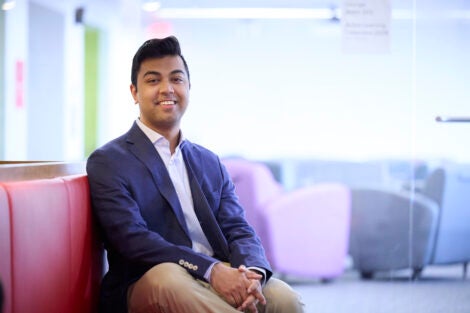April 9, 2024—Despite the oceans separating Boston and Bangladesh, Irfan Chaudhuri, SM ’24, always remained close with his grandparents. In a recent interview, he discussed how their lives helped inspire his path to public health and a master of science degree in neuropsychiatric epidemiology from Harvard T.H. Chan School of Public Health.
My calling to public health came from my maternal grandmother. She was a very close person to me and unfortunately got sick with Alzheimer’s disease. In high school, I visited her in Bangladesh and saw the rapid decline of her memory and her ability to recognize loved ones. That was really tough—and made me want to want to take action. Rather than becoming a physician and treating people once they’ve been diagnosed, I was interested in the public health approach—how we might prevent people from getting Alzheimer’s altogether.
Health policy also called out to me during an internship on Capitol Hill in 2016 working for then-Congressman David Cicilline from Rhode Island. We were working on a bill to further regulate assault weapons in the wake of another mass shooting. The bill didn’t go through—I wish it had—but that experience further piqued my interest in public health, specifically how to influence it through legislative action.
I double majored in chemistry and education in college. I focused on organic synthesis and analytical chemistry for a potential future in drug development. I’ve taken a bit of a different path now, but it’s been helpful to have that background in how biochemical mechanisms work in the body. Education was a personal interest major, again stemming from my grandparents’ influence. Late in his life, my grandfather started a school for underprivileged high school kids in Bangladesh. I got the opportunity to work as a teacher’s assistant there and it inspired me to pursue education and consider how we can improve the lives of all people, not just those who are more privileged.
Social justice and equity were words that came up in education classes all the time. It was in the context of theories on how to promote equity in schools that I was exposed to these concepts—but there are a lot of parallels to public health, which is a field trying to promote equity at the population level and promote safe, healthy lives for all people.
What most drew me to Harvard Chan School was the Department of Epidemiology, where there’s a huge focus on Alzheimer’s. Much of Albert Hofman and Deborah Blacker’s research, for example, is in the realm of Alzheimer’s and dementia. I spoke to Dr. Blacker once I got accepted to the school and it was immediately clear I would have a myriad of great research opportunities within the Alzheimer’s field. She’s now my academic and thesis advisor.
My master’s thesis investigates if there is a correlation between dementia risk and the BCG vaccine, which is used to protect against tuberculosis, specifically to see if the risk of dementia is reduced. For the last year and a half, I’ve been looking at observational data to see who received the vaccine, who didn’t, and the onset of dementia. I’ve also been zeroing in on sub-populations with a greater baseline risk of dementia to see if the BCG vaccine may have an outsized impact on reducing their chances of developing the disease. I’m looking forward to finalizing the study and publishing the results.
What’s most impressed me at Harvard Chan School has been faculty and students’ level of engagement. For example, I took a class on reproductive and perinatal epidemiology taught by Professor Carmen Messerlian. I enrolled because of other students’ recommendation, and by the end, I was wondering if I could take on another project in that sub-field, because of how passionate she was about her research and her engagement with us students.
My advice to fellow and future students would be: Take some classes outside of your specific career goals and make the most of the amazing diversity of courses available to you. Get to know your classmates—Harvard is filled with students who bring an incredible diversity of perspectives and backgrounds. They will challenge you to think critically and embrace new ideas. Lastly, find a faculty member you really enjoy working with to pursue thesis work or an additional research project.
After graduation, I’ll further pursue research around Alzheimer’s and dementia. I do see myself more in the research realm of public health, but I hope to also use my education and policy experiences to make sure my research is oriented toward equity and that its fruits reach all people, not just those with access to high quality health care. I would also love to get back into teaching, hopefully as a professor.
Outside the classroom, I enjoy playing basketball and soccer with classmates and I play the piano. In high school, I was a very dedicated pianist and was invited to perform solo at Carnegie Hall several times. I still keep up with it and play for family and friends, but it’s more of a hobby now.
Photo: Kent Dayton
